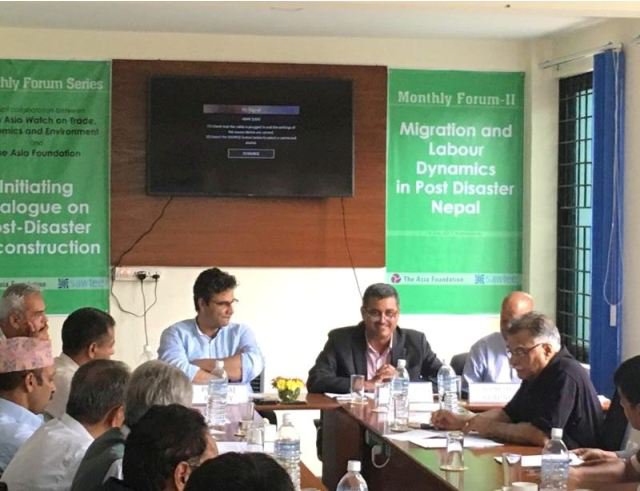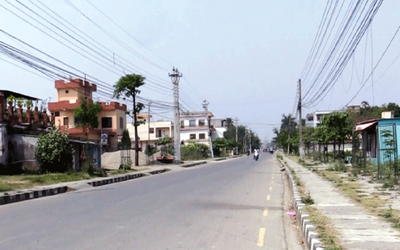
Despite decelerated outflow of migrant workers from Nepal post April 2015, the reconstruction work is hit by the shortage of manpower. The experts argue that the shortage of labor can delay the progress in the process of reconstruction.
Organized under a project called ‘Initiating Dialogue on Post-Disaster Reconstruction’ with support from The Asia Foundation, the project, a series of dialogues is being conducted on various topics related to the post-disaster reconstruction. Today, a discussion was held on ‘Migration and Labor Dynamics in Post Disaster Nepal’, in which, Nepal’s prominent labor and migration expert Dr Ganesh Gurung presented his research findings.
The data shows that the monthly outmigration for foreign employment stood at around 50,000 persons has stabilized below 40,000 since the earthquake, he pointed out. At the same time, reconstruction efforts have been affected by lack of laborers, he added.
According to press release issued by SAWTEE, to meet the labor shortage, reconstruction is being handed over to migrant laborers from India and Bangladesh, he said. Moreover, the earthquake has also diverted migration from Nepal’s mid and far western hills to the earthquake affected districts in central and western Nepal, he pointed out. The earthquake has pushed the daily wage from Rs 500 to Rs 800 in the rural areas.
Similarly, speaking as a discussant in the program Ramesh Badal, Secretary, Department of Foreign Affairs at General Federation of Nepalese Trade Unions, said that we should not be swept away by counting remittance income without considering the other social costs in terms of health, missed opportunities, breakdown of families among others. He also pointed out that many migrant workers wanted to stay in Nepal but could not stay, due to contracts with the employers, which has made their state as that of bonded labor.
During discussion, Dr Posh Raj Pandey, chairman of SAWTEE expressed that remittance can emerge as a resource for reconstruction financing but then it can only be taken as a means to sustain in the short-run.
Kiran Nepal, Editor at the Himal Khabarpatrika also stressed on the social cost of the migration of labor which is creating a negative impact on our strong social fabric.
Similarly, Dr Jagadish Chandra Pokharel, former vice chairman of National Planning Commission also pointed out that people in the affected areas have postponed plans to seek jobs abroad due to delayed distribution of government compensation to rebuild destroyed houses.
Participants representing civil society organizations, academia, labor unions, foreign employment agencies pointed out issues such as, ‘free visa, free tickets’ for migrant workers post-earthquake has, in fact, created confusion delaying the departure of workers; expenditure of remittance income on education should be considered an investment not consumption creating positive impact on the economy; country has not focused on utilizing expertise of returnee migrant workers for rebuilding, among others.
- TANAHU HYDROPOWER PROEJCT: A Significant Achievement
- Apr 15, 2024
- AMBASSADOR HANAN GODAR: Sharing Pain With A Nepali Family
- Mar 30, 2024
- VISIT OF KfW AND EIB TO NEPAL : Mission Matters
- Mar 25, 2024
- NEPAL BRITAIN SOCIETY: Pratima Pande's Leadership
- Mar 24, 2024
- NEPAL ARMY DAY: Time To Recall Glory
- Mar 15, 2024
















